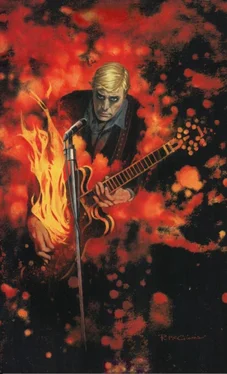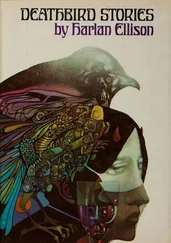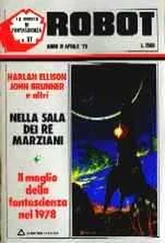Harlan Ellison
Spider Kiss
This is a work of fiction. It is intended, however, to convey a reasonably accurate impression of a segment of contemporary life as it existed during the period 1950-1960; a segment of show business based on the reality of the time.
To convey a feeling of verisimilitude, I have employed the names of real persons, places, organizations, and events. Any such use, however, is intended strictly for story-value, and it should be understood that any part they play in this fiction is a product of literary license employing figures whose public images are clearly in the public domain, and in no way implies any actual participation in reality. Of the fictional characters, woven from the whole cloth of the imagination, there may be those who seem to have counterparts in real life. Anyone attempting to “rip aside the masks” to discern the “real” people underneath, should be advised they’re wasting their time. Stag Preston and all the others are composites, a chunk from here, a hand movement from there, a mannerism from somewhere else. He is many people and he is no one: he is a symbol, if you have to have labels. I have tried to tag a type.
Types have no names. Or, to quote from Mark Twain:
“Persons attempting to find a motive in this narrative will be prosecuted: persons attempting to find a moral in it will be banished: persons attempting to find a plot in it will be shot.”
It is a fable; who can be offended by a fable?
Harlan Ellison
For the fifth time around,
This one is dedicated to the Lady who knew it ain’t as easy as it looks.
For my ex-wife BILLIE, with affection and respect.
First there was only the empty golden circle of the hot spot, blazing against the silk curtains. That, and in another vein, the animal murmuring of the audience, mostly teen-age girls with tight sweaters and mouths open-crammed by gum.
For what seemed the longest time that was the portrait: cut from primordial materials in an expectant arena. There was a tension so intense it could be felt as warmth on the neck, uncontrollable twitches in the lips and eyes, the nervous shifting of small hands from nowhere to nowhere.
The curtains gave a vagrant rustle and from three parts of the orchestra and four parts of the balcony came piercing, wind-up-a-chimney shrieks of pleasure and torment. Behind the velvet ropes, overflow crowds pressed body on body to get a neck-straining view of the stage. Just those purple and yellow draperies, the golden coin of the spotlight beam. The scene was laid with a simple, but forceful, altogether impressive sense of dramatics.
In the pit, the orchestra began warming its sounds, and the jungle murmur of the anxious crowd rose a decibel. There would be no Master of Ceremonies to start festivities, no prefatory acts—the Tumbling Turellos; Wally French & Sadie, the educated dachshund; Ivor Harrig with mime and merriment; The DeLaney Sisters—there would only be that golden spotlight, a blast of sound, and the curtains would part. This was one man’s show, as it had been one man’s show for two weeks. This was The Palace, and it had been invaded.
Two weeks before they had made The Palace alter all its precedents. The screaming, feral teen-age girls with their eyes like wine-soaked jewels, their mouths hungry, their adolescent bodies rigged and trussed erotically. They had booed and hissed the other acts from the stage before they could gain a hearing. They had stamped and clamored so outrageously, the booker and stage manager had decided—in the absence of the manager—to cut straight through to the feature attraction, the draw-card that had brought an audience rivaled only by the gates of Garland, Belafonte and in days past, Martin & Lewis.
They had set the other acts aside, hoping this demonstration was only an opening day phenomenon. But it had been two weeks, with SRO at every performance, and the other acts had been paid off, told a profusion of sorrys, and the headliner had lengthened his stint to fill the space. He seemed, in fact, suffused with an inner electricity that allowed him to perform for hours without fatigue. The Palace had regretfully acquiesced … they had been conquered, and knew it.
Now, as the golden moon-face contracted, centering at the overlapping folds of the curtains, the orchestra burst into song. A peculiar song; as though barely adaptable to full brass and strings, it was a repetitive melody, underslung with a constant mechanical piano-drum beat, simple and even nagging. Immature but demanding, infectious.
The audience exploded.
Screams burst from every corner of the theatre, and in the first twenty-seven rows of the orchestra, girls leaped from seats as though spastic, lanceted with emotional fire. A senseless, building fury consumed The Palace and beat at the walls, reverberated out onto Seventh Avenue. The love affair was about to be consummated—again.
The curtains withdrew smoothly, the golden circle of light fell liquidly to the stage, hung in the black mouth of no scenery, no cyclorama, nothing, and the orchestra beat to a crescendoing final riff.
Silence…
The hushed intake of a thousand, three thousand, too many thousand breaths…
The muscle-straining expectancy as bodies pressed upward toward the empty space soon to be filled…
The spotlight snapped off…
Darkness…
Then back to life and he was there !
If the insanity that had ruled seventy-six seconds before was great, what was now loosed could only be called Armageddon. Seats clanged up against the backs of chairs, a Perdition’s chorus of screams, wails, shrieks, moans and obscenities crashed and thundered like the waves on the Cliff at Entretat. Hands reached fervently, feverishly, beseechingly upward. Girls bit their fists as their eyes started from their heads. Girls spread their hands against their breasts and clutched them with terrible hunger. Girls fell back into their seats, reduced to tears, reduced to jelly, reduced to emotional orgasms of terrifying intensity.
While he stood quietly, almost humbly, watching.
His name was intoned, extolled, cast out, drawn in, repeated, repeated repeated repeated till it became a chant of such erotic power it seemed to draw all light and sound to it. A vortex of emotionalism. With him at its center, both exploding and imploding waves of animal hunger.
He was of them, yet not of them. With them, yet above them.
He stood tall and slim, his legs apart, accentuating the narrowness of his hips, his broad shoulders, the lean desperation of his face, the auburn shock of hair, so meticulously combed with its cavalier forelock drooping onto his forehead.
A guardian of unnamed treasures.
Then he began to play. His hands moved over the frets of the guitar slung across his chest, and a guttural, sensuous syncopation fought with the noise of the crowd … fought … lost momentarily … lost again … crowd swell … then began to mount in insistence … till the crowd went under slowly slowly … till he was singing high and loud and with a mounting joy that caught even the self-drugged adolescents who had not come to listen, merely to worship.
His song was a pointless thing; filled with pastel inanities; don’t ever leave me because I’ve got a sad dog heart that’ll follow you where’er you go, no, don’t leave me ’cause my sad dog heart cries just for you for you, ju-ust fo-o-o-or you…
But there was a subtext to the song. Something dark and roiling, an oil stain on a wet street, a rainbow of dark colors that moved almost as though alive, verging into colors that had no names, disturbing colors for which there were only psychiatric parallels. Green is the dead baby image…
Читать дальше












